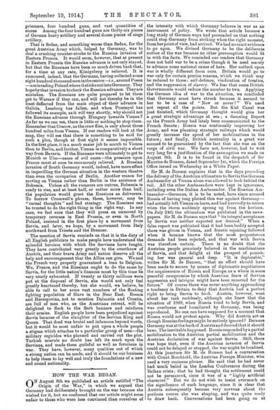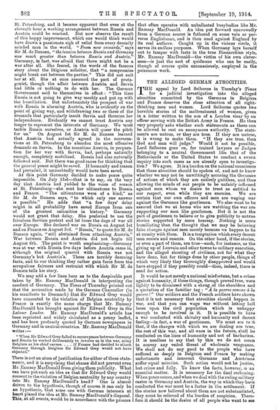HOW THE WAR BEGAN.
ON August 8th we published an article entitled "The Origin of the War," in which we argued that Germany had deliberately brought on the war because she wished for it, but we confessed that our article might seem unfair to those who were less convinced than ourselves of the intensity with which Germany believes in war as an instrument of policy. We wrote that article because a long study of German ways had persuaded us that nothing could stop Germany from striking when the right moment, from her pointof view, had arrived. We had no exact evidence to go upon. We divined Germany to be the deliberate author of the war because no other presumption would fit in with the facts. We reminded our readers that Germany does not hold war to be a crime though it be used merely to advance some national cause of hers. Her outlook upon war is wholly different from ours. Britain would go to war only for certain precise reasons, which we think may be reduced to three: self-defence, vindication of treaties, and the suppression of slavery. We fear that some British Governments would reduce the number to two. Applying the German idea of war to the situation, we concluded that Germany must have struck because it seemed to her to be a case of " Now or never ! " We need not repeat all the points. But the Kiel Canal was just finished, which Germany thought would give her a great strategic advantage at sea ; a damning Report on the French Army had lately been communicated to the French Senate ; Russia was continually improving her Army, and was planning strategic railways which would greatly increase the speed of her mobilizations in the future ; and finally, British neutrality in a great war seemed to be guaranteed by the fact that she was on the verge of civil war. We have not, however, had to wait very long for a justification of the assumption we made ou August 8th. It is to be found in the despatch of Sir Maurice de Bunsen, dated September 1st, which the Foreign Office issued on Wednesday as a White Paper.
Sir M. de Bunsen explains that in the days preceding the delivery of the Austrian ultimatum to Servia the German Ambassador at Vienna alone was allowed to look behind the veil. All the other Ambassadors were kept in ignorance, including even the Italian Ambassador. The Russian Am- bassador—Germans, it is to be noted, have since accused Russia of having long plotted this war against Germany— had actually left Vienna on leave, and bad hurriedly to return when the storm suddenly sprang up from the horizon. On July 24th the ultimatum was published in the news- papers. Sir M. de Bunsen says that " its integral acceptance by Servia was neither expected nor desired." When a false report was published that it had been bodily accepted there was gloom in Vienna, and frantic rejoicing followed when it became known that the most preposterous demands had been rejected, and that war with Servia was therefore certain. There is no doubt that the Austrian people genuinely believed in the machinations of Servia, and that delight at the prospect of punish. ing her was general and deep. "It is deplorable," writes Sir M. de Bunsen, " that no effort should have been made to secure by means of diplomatic negotiations the acquiescence of Russia and Europe as a whole in some peaceful compromise by which Austrian fears of Servian aggression and intrigue might have been removed for the future." Of course there was never anything approaching a tendency in Britain to deny that Austria had a perfect right to bring Servia to book. Austria, however, went about her task recklessly, although she knew that the situation of 1909, when Russia tried to help Servia, and was overborne and humiliated by Germany, was being reproduced. No one can have supposed for a moment that Russia would not protest again. Why did Austria act as though Russianfeelings might be entirely ignored? Because Germany was at the back of Austriaand desired that it should be so. The inevitable happened. Russia responded by a partial mobilization to the Austrian partial mobilization and the Austrian declaration of war against Servia. Still, there was hope that, even if the Austrian invasion of Servia could not be delayed or stopped, the war might be localized. At this juncture Sir M. de Bunsen had a conversation with Count Berchtold, the Austrian Foreign Minister, who used a. very ominous phrase. He said that he had never had much belief in the London Conferencee during the Balkan crisis ; that he had thought the settlement could not be permanent, since it was of a " highly artificial character.' But we do not wish to insist overmuch on the significance of such language, since it is clear that Austria subsequently became very nervous about the perilous course she was shaping, and was quite ready to draw back. Conversations had been going on at St. Petersburg, and it became apparent that even at the eleventh hour a working arrangement between Russia and Austria could be reached. -But now observe the result of this happy improvement, which one would think would have drawn a, passionate sigh of relief from every decently minded man in the world. "From now onwards," says Sir M. de Bunsen, " the tension between Russia and Germany was much greater than between Russia and Austria." Germany, in fact, was afraid that there might not be a war after all. She feared, in the words of the famous story about the litigious solicitor, that " a compromise might break out between the parties." This did not suit her at all. She at once assumed the part of prota- gonist, though the affair between Austria and Servia had little or nothing to do with her. The German Government said to themselves in effect : "This time Russia is not going to give way meekly and put up with the humiliation. But unfortunately the prospect of war with Russia is alarming Austria, who is evidently on the point of giving way, and withdrawing two or three of the demands that particularly insult Servia and threaten her independence. Evidently we cannot trust Austria any longer to represent the interests of Germany. We must tackle Russia ourselves, or Austria will queer the pitch for us." On August 1st Sir M. de Bunsen learned that Austria had actually agreed in the conversa- tions at St. Petersburg to abandon the most offensive demands on Servia. In the meantime Austria, in prepara- tion for her war with Servia, had, perhaps naturally enough, completely mobilized. Russia had also naturally followed suit. But there was good cause for thinking that the general peace might be saved. If humanity and reason had prevailed, it undoubtedly would have been saved.
At this point Germany decided to make peace quite impossible. On July 31st—that is to say, on the very day that Austria had yielded to the voice of reason at St. Petersburg—she sent her ultimatums to Russia and France. " The ultimatums were of a kind," as Sir M. de Bunsen says, " to which only one answer is possible." He adds that "a few days' delay might in all probability have saved Europe from one of the greatest calamities in history." Germany would not grant that delay. She preferred to use the frivolous Servian pretext and let loose the dogs of war all over Europe. She declared war on Russia on August 1st and on France on August 3rd. " Russia," to quote Sir M. do Bunsen again, " still abstained from attacking Austria." War between Russia and Austria did not begin till August 6th. The point is worth emphasizing—Germany was at war with Russia five days before Austria came in, although the original quarrel with Russia was not Germany's but Austria's. These are terribly damning facts, and to our thinking they rather gain force from the scrupulous fairness and restraint with which Sir M. de Bunsen tells his story.
We may add a few lines here as to the despicable part taken by Mr. Ramsay MacDonald in interpreting the conduct of Germany. The Times of Thursday pointed out that the accusation made by the German Chancellor (in his manifesto to Denmark) that Sir Edward Grey would have consented to the violation of Belgian neutrality by France is exactly the same charge that Mr. Ramsay MacDonald has brought against Sir Edward Grey in the Labour Leader. Mr. Ramsay MacDonald's article has been reprinted and widely circulated as a penny leaflet, and has been profusely quoted by German newspapers in Germany and in neutral countries. Mr. Ramsay MacDonald writes :— " When Sir Edward Grey failed to secure peace between Germany and Russia he worked deliberately to involve us in the war, using Belgium as his chief excuse. . . . if France had decided to attack Germany through Belgium Sir Edward Grey would not have objected."
There is not an atom of justification for either of these state- ments, and it is surprising that shame did not prevent even Mr. Ramsay MacDonald from giving them publicity. What can have put such an idea as that Sir Edward Grey would consent to the violation of Belgian neutrality by any country into Mr. Ramsay MacDonald's head ? One is almost driven to the hypothesis, though of course it can only be an hypothesis, that some one with German interests at heart placed the idea at Mr. Ramsay MacDonald's disposal. This, at all events, would be in accordance with the process that often operates with unballasted busybodies like Mr. Ramsay MacDonald. An idea put forward unavowedly from a German source is fathered on some vain or per- verse Englishman, and is then used against England by its real authors. Caught up in the vicious circle, it serves its endless purposes. When Germany lays herself out to tamper with facts in the true Bismarckian style, Mr. Ramsay MacDonald—the -victim of his own clever- ness—is just the sort of quidnuno who can be easily, though of course quite unconsciously, employed in the poisonous work.



































 Previous page
Previous page